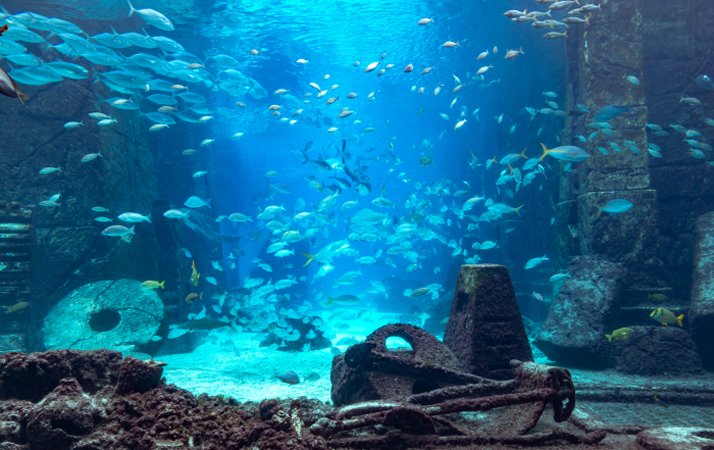Riddle Of Brazilian Atlantis – Strange Discovered Rocks The World Forgot About
Ellen Lloyd - AncientPages.com - The legendary lost continent of Atlantis appears in ancient myths and legends worldwide. Ancient people were familiar with a marvelous land that vanished a very long time ago.
Researchers have debated the existence of Atlantis for years. Some say the continent is nothing but a myth, while others are convinced, we will one day uncover the remains of this long-lost land.
Finding the remains of Atlantis is challenging because it’s difficult to determine where to look. Also, let us assume we do find ancient underwater ruins, how can we say with certainty these are the remains of Atlantis? There are many submerged ancient cities.
The quest for the lost underwater land has not ended. Credit: Foto-Jagla.de - Adobe Stock
There are several underwater ruins in various places worldwide, and all of them could be part of Atlantis. Atlantis is Greek for the 'island of Atlas'.
Plato mentioned the sunken continent of Atlantis in his dialogues Timaeus and Critias.
Plato relates the legend of a powerful nation that around 9,500 B.C. inhabited a continent greater in size than ancient Libya and Asia combined.
According to Plato, this powerful nation attacked and conquered Europe and Asia.
Apparently, only the Greeks were able to prevail against them. As the story goes, sometime after the invasion the Greeks and the Atlanteans were swallowed up by the sea. The disaster happened quickly and unexpectedly.
Over the years several researchers claim to have uncovered parts of the sunken legendary continent and there have been several speculations regarding the location of the sunken land.
For example, In Atlantis: The Lost Continent Finally Found, Professor Arysio Santos makes a persuasive and well-researched case for Atlantis being in the region of Indonesia.
"Atlantis was never found because we have all been looking in the wrong places. Realizing that, we started to look for the spot where an entire sunken continent could be hiding itself. Geology afforded the correct, irrefutable answer: down under the South China Sea, that is where. The rest followed quite naturally and, in fact, far more serendipitously than we ourselves could ever have imagined beforehand," late Professor Arysio Santos explained.
1997 Interview with Prof. Arysio Santos
We have seen on previous occasions scientists are making remarkable progress in the area of underwater archeology, but a huge portion of our oceans remains unexplored.
According to the National Ocean Service, it is estimated that only 5 percent of Earth's oceans have been explored and charted. The rest remains mostly undiscovered and unseen by humans. With so much territory still left to explore, we can only imagine the discoveries yet to come!
In recent years, we have been given the privilege to see photos of remarkable underwater ruins, such as the magnificent legendary lost city of Heracleion.
With the help of the latest technology, we have the opportunity to explore the secrets of oceans as never before. For example, the legendary lost underwater city of Pavlopetri is often described as the world's oldest city. Some think that these underwater ruins are remains of the legendary city of Atlantis.
Some years ago, geologists discovered puzzling rocks off the coast of Rio in Brazil. According to Roberto Ventura Santos, a top official at Brazil's Geology Service (CPRM), the granite samples were found two years ago during dredging operations in an area known as "Rio Grande Elevation" range in Brazilian and international waters.
At the time of the discovery, Santos said that these rocks were likely part of a continent that sunk into the ocean when Africa and South America drifted apart 100 million years ago - dubbing the discovery the 'Brazilian Atlantis'.
Brazil's Geology Service dredged the seabed off the coast of Rio, near the Rio Grande Elevation. Among the rocks found were granite samples that are thought to be part of a continent submerged by the Atlantic Ocean when Africa and South America split 100 million years ago. Credit: Geological Service of Brazil
"This could be the Brazilian Atlantis. We are almost certain, but we must bolster our hypothesis. We will have final (scientific) recognition this year when we conduct drilling in the area to retrieve more samples of these rocks," Santos said then.
Could this rock be part of the legendary lost continent of Atlantis? Credit: Geological Service of Brazil
Initially, the scientists thought they were mistaken. Still, their case was bolstered when a team of Brazilian and Japanese scientists aboard Japan's manned research submersible Shinkai 6500 observed the underwater geological formation opposite the Brazilian coast.
As researchers explored the region, they began to see that the area could be a piece of the continent that disappeared into the sea millions of years ago.
Should these rocks be considered as possible physical evidence of Atlantis? For the time being, it is difficult to say anything about this discovery. To confirm geologists' claims, someone must be interested in testing these rocks and examine the underwater formations.
Unfortunately, reports of recent research are lacking, and it seems nothing has been done in years. It happens far too often scientists discovered something of tremendous historical, archaeological, or geological interest, but follow-ups of the discoveries are unheard of.
Written by Ellen Lloyd – AncientPages.com
Updated on June 27, 2021
Copyright © AncientPages.com All rights reserved. This material may not be published, broadcast, rewritten or redistributed in whole or part without the express written permission of AncientPages.com
More From Ancient Pages
-
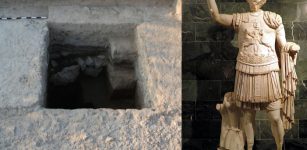 Unfinished Roman Aqueduct Discovered In The Hellenistic Royal City Of Artashat-Artaxata In Ancient Armenia
Archaeology | Nov 16, 2021
Unfinished Roman Aqueduct Discovered In The Hellenistic Royal City Of Artashat-Artaxata In Ancient Armenia
Archaeology | Nov 16, 2021 -
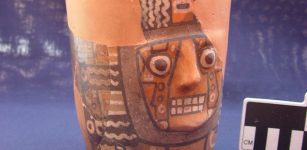 Ancient Pottery Reveal How Peru’s First Great Empire Wari Functioned
Archaeology | Mar 14, 2023
Ancient Pottery Reveal How Peru’s First Great Empire Wari Functioned
Archaeology | Mar 14, 2023 -
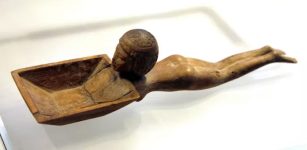 Intriguing And Suprising Ancient History Of Swimming That Started Over 100,000 Years Ago
Featured Stories | Dec 28, 2022
Intriguing And Suprising Ancient History Of Swimming That Started Over 100,000 Years Ago
Featured Stories | Dec 28, 2022 -
 Evidence Of Unusual Solar Activity Discovered On Ancient Cuneiform Tablets
Archaeology | Oct 16, 2019
Evidence Of Unusual Solar Activity Discovered On Ancient Cuneiform Tablets
Archaeology | Oct 16, 2019 -
 Identity Of Anti-Christ And Number 666 Revealed By Ancient History Professor
Archaeology | Apr 6, 2019
Identity Of Anti-Christ And Number 666 Revealed By Ancient History Professor
Archaeology | Apr 6, 2019 -
 Surprising Time Capsule In Antarctica – Evidence Of Toxic Heavy Metal Pollution 800 Years Ago
Earth Changes | Jan 18, 2024
Surprising Time Capsule In Antarctica – Evidence Of Toxic Heavy Metal Pollution 800 Years Ago
Earth Changes | Jan 18, 2024 -
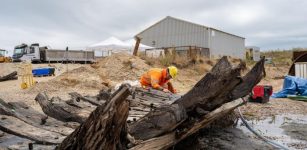 Rare Unexpected Discovery Of Elizabethan-Era Ship At Quarry 300 Meters From The Coast
Archaeology | Jan 2, 2023
Rare Unexpected Discovery Of Elizabethan-Era Ship At Quarry 300 Meters From The Coast
Archaeology | Jan 2, 2023 -
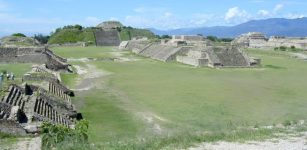 Ancient Mexican City Endured For Centuries Without Extremes In Wealth And Power
Archaeology | Mar 8, 2022
Ancient Mexican City Endured For Centuries Without Extremes In Wealth And Power
Archaeology | Mar 8, 2022 -
 Lacrosse Was Invented By Native American Indians
Ancient History Facts | May 1, 2016
Lacrosse Was Invented By Native American Indians
Ancient History Facts | May 1, 2016 -
 Levänluhta People Could Survive Fimbulwinter Thanks To Their Diverse Livelihoods
Archaeology | Apr 24, 2020
Levänluhta People Could Survive Fimbulwinter Thanks To Their Diverse Livelihoods
Archaeology | Apr 24, 2020 -
 Golden ‘Etruscan’ Orphic Book – Six Golden Pages Of The Oldest Book In History Of Mankind
Artifacts | Mar 27, 2020
Golden ‘Etruscan’ Orphic Book – Six Golden Pages Of The Oldest Book In History Of Mankind
Artifacts | Mar 27, 2020 -
 Unravelling The Mystery Of Apollonius Of Tyana – Was He A Superhuman?
Featured Stories | Sep 17, 2015
Unravelling The Mystery Of Apollonius Of Tyana – Was He A Superhuman?
Featured Stories | Sep 17, 2015 -
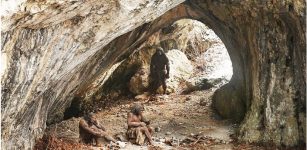 Ancient Secrets Of Polish Ciemna Cave Inhabited By Humans 120,000 Years Ago
Featured Stories | Nov 22, 2016
Ancient Secrets Of Polish Ciemna Cave Inhabited By Humans 120,000 Years Ago
Featured Stories | Nov 22, 2016 -
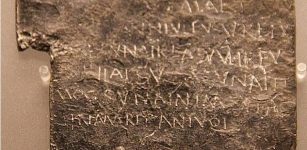 Defixiones: Ancient Roman Curse Tablets Became Big Business
Ancient History Facts | Apr 10, 2016
Defixiones: Ancient Roman Curse Tablets Became Big Business
Ancient History Facts | Apr 10, 2016 -
 First-Ever Discovery Of Roman Road Network Spanning The South West UK Made By LIDAR
Archaeology | Aug 7, 2023
First-Ever Discovery Of Roman Road Network Spanning The South West UK Made By LIDAR
Archaeology | Aug 7, 2023 -
 Underwater Excavations: Greek And Danish Archaeologists Research Ancient Harbor Town Lechaion
Archaeology | Dec 25, 2015
Underwater Excavations: Greek And Danish Archaeologists Research Ancient Harbor Town Lechaion
Archaeology | Dec 25, 2015 -
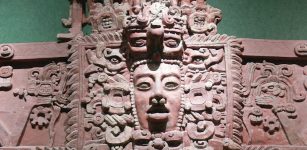 Ancient Maya Lessons On Surviving Drought – Examined By Scientists
Archaeology | Jan 5, 2022
Ancient Maya Lessons On Surviving Drought – Examined By Scientists
Archaeology | Jan 5, 2022 -
 Stunning Discovery Of 1,000-Year-Old Knight’s Sword From Reign Of Poland’s First King Bolesław The Brave
Archaeology | Jul 28, 2022
Stunning Discovery Of 1,000-Year-Old Knight’s Sword From Reign Of Poland’s First King Bolesław The Brave
Archaeology | Jul 28, 2022 -
 Roman Leather Toy Mouse Found At Vindolanda
Archaeology | Jun 6, 2023
Roman Leather Toy Mouse Found At Vindolanda
Archaeology | Jun 6, 2023 -
 Number Nine: Sacred Symbol In Ancient Cultures
Ancient Symbols | Feb 14, 2017
Number Nine: Sacred Symbol In Ancient Cultures
Ancient Symbols | Feb 14, 2017

